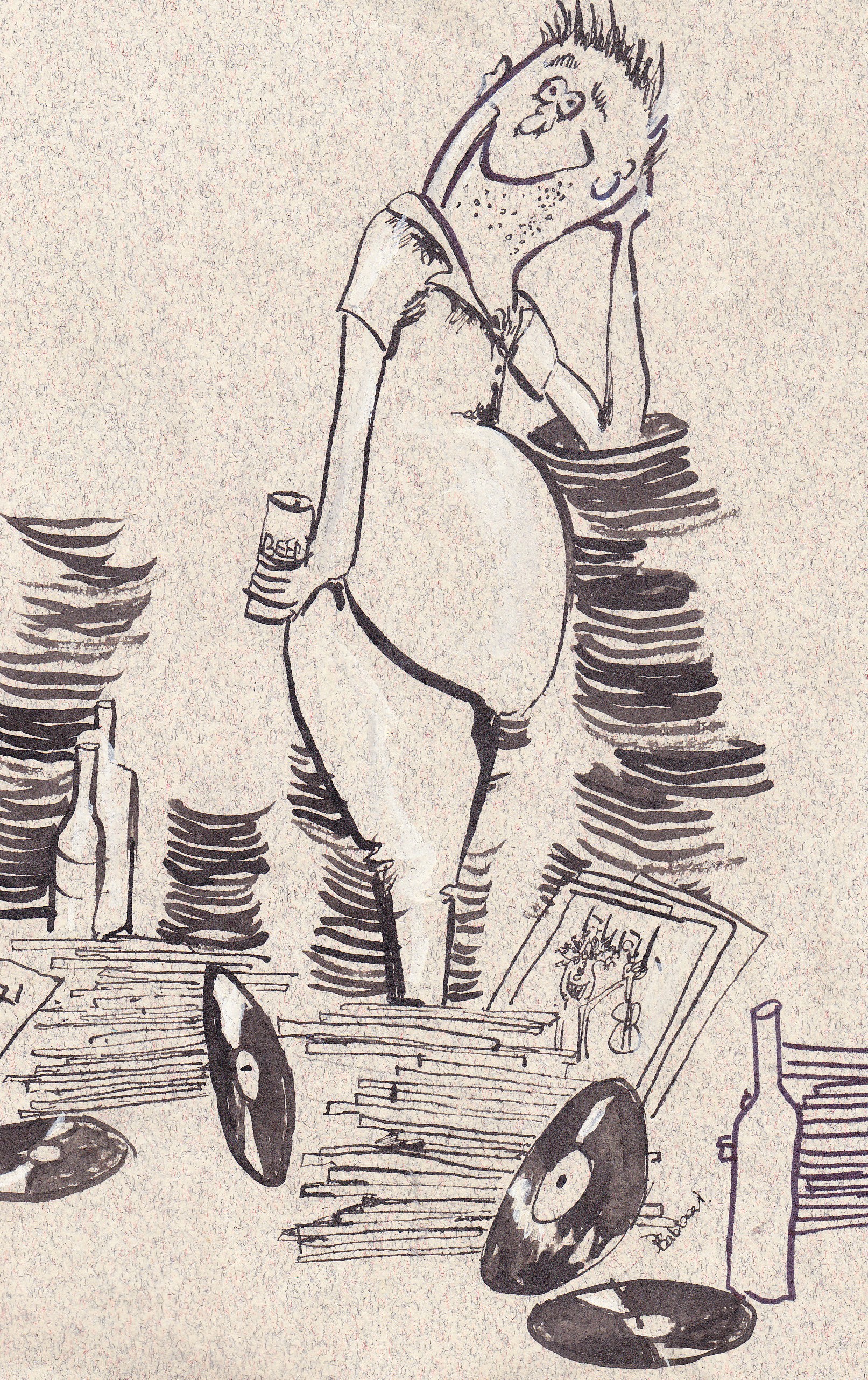British Invasion Bands
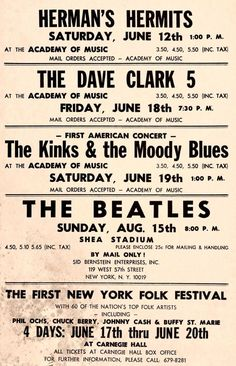 British Invasion bands dominate this U.S. show at Shea Stadium, June 1964
British Invasion bands dominate this U.S. show at Shea Stadium, June 1964The Bands that lead the British Invasion
British Invasion bands, how did they get their start? British bands, and music, were in short supply prior to the Beatles and the Liverpool sound, the world market was a largely American dominated. Even stars from the U.K. that occasionally broke through with hits sang with American accents. Often, they tied to conceal where they were from, so adopted the American accent as much as possible..
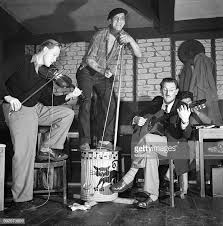 The scene in any club in Britain in the 50's, a hot skiffle group. Note the tea Chest bass.
The scene in any club in Britain in the 50's, a hot skiffle group. Note the tea Chest bass.The British Invasion Bands that Got it all Started
Trad jazz and skiffle, were the exception the this rule. And it was in the Jazz clubs around the cities of England, especially the sea ports, where the British Boom had it's beginning
How did the British Invasion Bands get the whole thing started?
At the end of 1962, readers of the Melody Maker music paper voted Cliff Richard and Helen Shapiro best U.K. Singers. But in the clubs of cities in the U.K., like Liverpool, musicians were listening to records brought back from America of a different form of music. In Liverpool, and other U.K. cities, in the '50's the skiffle groups thrived.
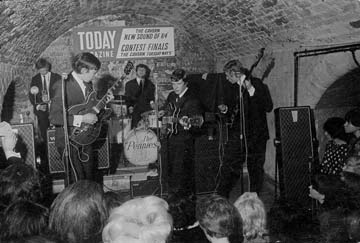 The Cavern, a typical lunchtime session.
The Cavern, a typical lunchtime session.Liverpool Sets the Scene!
But, by early 1960, a lot of kids had put these guitars and
improvised instruments away, as the slickly arranged American music, dominating
the English charts, took over. The Shadows being a notable exception.
And in Liverpool, it things started to happen. This was the birthplace of the British Invasion!
Merseyside had long had a strong independent identity. The Liverpool folk started listening to American R&B and Country music brought over on ships by the Merchant sailers. This music was not generally available to other British towns, and greatly appealed to the kids of Liverpool.
Steadily, the washboards and tea chests were replaced by guitars and drum kits.
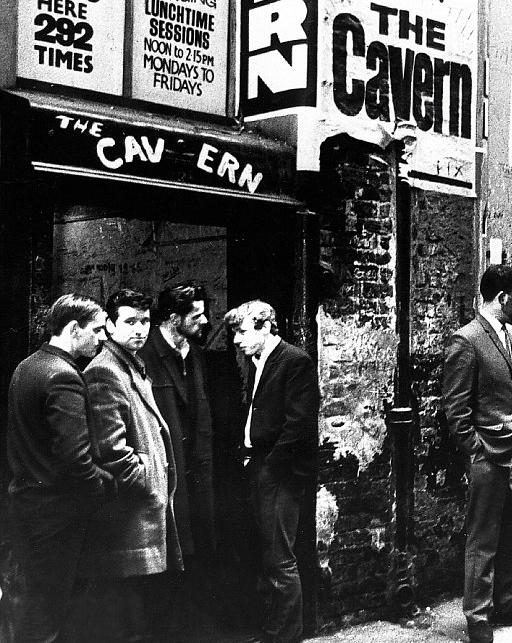 The cue to get into the Cavern, any lunchtime in Liverpool in the early 60's
The cue to get into the Cavern, any lunchtime in Liverpool in the early 60'sThings Get Serious!
The jazz clubs gradually moved over to this new music and, by 1961 in Liverpool there were over 300 beat groups plying their trade in the city. As these numbers grew, so did the number of places that the bands could play. A process began that was repeated in London a few years later.
The stage was set for the British invasion bands, and the ones that followed.
The most famous of these, of course, was the Cavern, where the Beatles played hundreds of times. Here there were lunch time sessions, as well as the evening sets. So, this was the birthplace of the British Invasion, the bands that blazed the trail and took American music back to America.
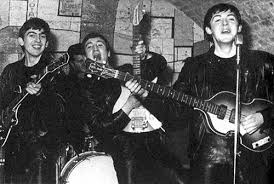 Left to right, George,(with his new Gretsch guitar) Pete, John and Paul, in a typical sweaty session at he cavern.
Left to right, George,(with his new Gretsch guitar) Pete, John and Paul, in a typical sweaty session at he cavern.So Who Were The British Invasion Bands?
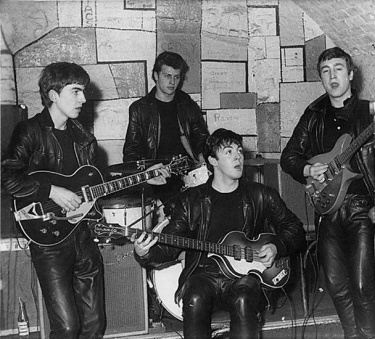 The same night, Paul doing his ballad set with John harmonizing.
The same night, Paul doing his ballad set with John harmonizing.The Beatles, spotted by Brian Epstein at the Cavern, were of course, the ones that got it all started.
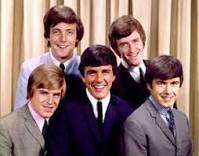 A forerunner in the British Invasion Bands..the Dave Clarke Five, neat, clean, and very British. Welcome to the Tottenham Sound. And they were good.
A forerunner in the British Invasion Bands..the Dave Clarke Five, neat, clean, and very British. Welcome to the Tottenham Sound. And they were good.Dave Clark Five, were next, of the British invasion bands with “Glad All Over” being the first band to knock the Beatles off the top of the charts. Soon, the Rolling Stones, originally a blues band from Richmond, Surrey, were also getting attention, and became “The greatest rock and roll band in the world”
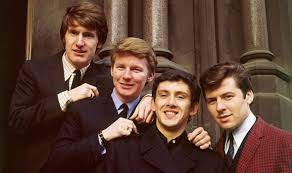 The Searchers at their peek. (L to R) Chris Curtis, drums, John McNally, guitar Tony Jackson, bass and Mike Pinder, lead guitar.
The Searchers at their peek. (L to R) Chris Curtis, drums, John McNally, guitar Tony Jackson, bass and Mike Pinder, lead guitar.Then the flood, the second most popular band on Merseyside. Classic faultless harmonies were a feature of The Searchers, who actually toured down here in Australia with the Stones.
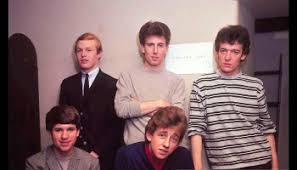 The Hollies original line up.(Rear) Bobby Elliott, Alan Clarke, Graham Nash, (Front) Erick Haydock and Tony Hicks. Hicks and Elliott remain with the band to this day.
The Hollies original line up.(Rear) Bobby Elliott, Alan Clarke, Graham Nash, (Front) Erick Haydock and Tony Hicks. Hicks and Elliott remain with the band to this day.And speaking of harmonies, how were those magic harmonies of The Hollies? Another very British, clean cut band who still sound as good today!
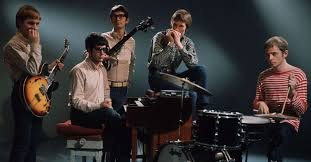 Manfred Mann preparing for a TV show. L to R, Mike Vickers, Manfred, John McGuinness, Paul Jones and Mike Hugg.
Manfred Mann preparing for a TV show. L to R, Mike Vickers, Manfred, John McGuinness, Paul Jones and Mike Hugg.The influence of the British Blues scene started to show itself on the charts, and one of the best of them was Manfred Mann.The classic vocals and harmonica playing of Paul Jones was a feature of this fine band. Variations of this band have continued till quite recently.
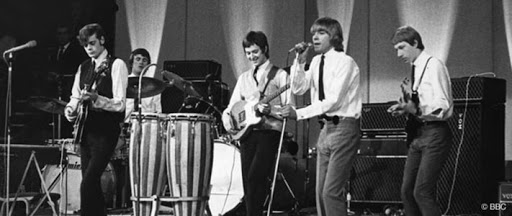 The Yardbirds Live! Always a great live band. Here, in full flight, (L to R) Paul Samwell Smith, Jim McCarty (partly obscured), Eric Clapton, and Chris Dreja.
The Yardbirds Live! Always a great live band. Here, in full flight, (L to R) Paul Samwell Smith, Jim McCarty (partly obscured), Eric Clapton, and Chris Dreja.And of course, one of the most important of the British invasion bands of the 60's, the Yardbirds, from whose ranks came Eric Clapton, Jeff Beck, and Jimmy Page.
Has any other band contributed more?
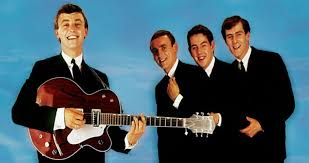 Typical of the early British Invasion bands, suites, collars and ties, Gerry and The Pacemakers.
Typical of the early British Invasion bands, suites, collars and ties, Gerry and The Pacemakers.Cementing the Liverpool domination of the charts, Liverpool's Gerry and The Pacemakers, signed by Brian Epstein, and produced by George Martin had three No. 1 hits in a row. This record stands to this day. Mersey beat had arrived, with Gerry being the second Mersey band to score a Number 1 hit
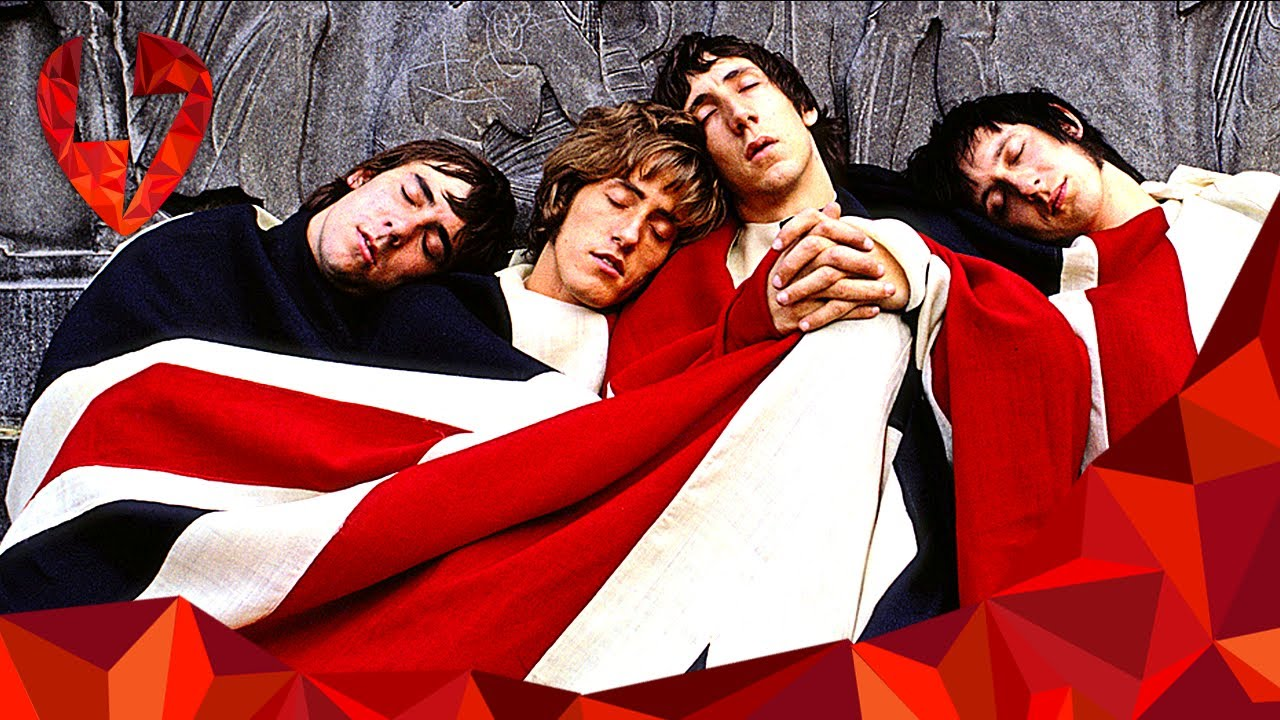 The Who, the dynamic band and leader of the mods. L to R, Keith Moon, Roger Daltry, John Entwistle, and the songwriter and leader, Pete Townshend.
The Who, the dynamic band and leader of the mods. L to R, Keith Moon, Roger Daltry, John Entwistle, and the songwriter and leader, Pete Townshend.And of course, the Who, the four piece band who were originally The High Numbers. Favorites of the Mod scene, The Who were consistent hitmakers over many years, and Pete Townshend created the first ever Rock Opera.
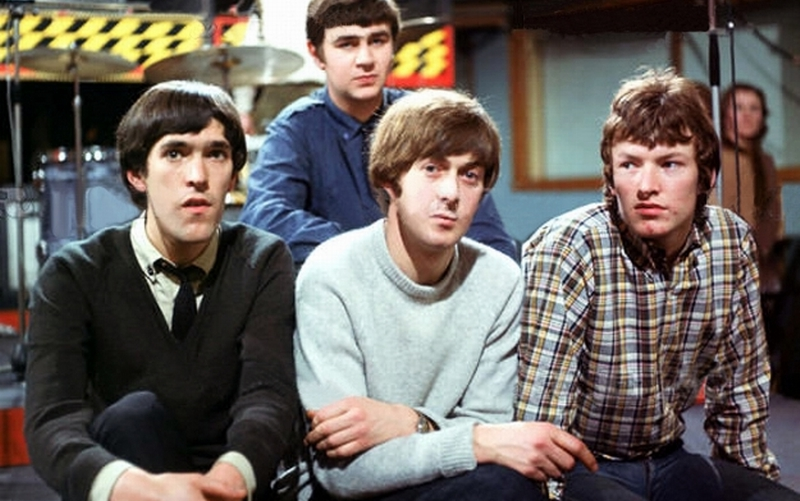 In a serious mood before yet another British TV show, (L to R ) Muff Winwood, Spencer Davis, Steve Winwood, and above, Pete York.
In a serious mood before yet another British TV show, (L to R ) Muff Winwood, Spencer Davis, Steve Winwood, and above, Pete York.The unique voice of Stevie Winwood set the Spencer Davis Group apart from many other bands working the Birmingham circuit. Also a great guitarist, harmonica and keyboard player, Steve was the focal point of this great band.
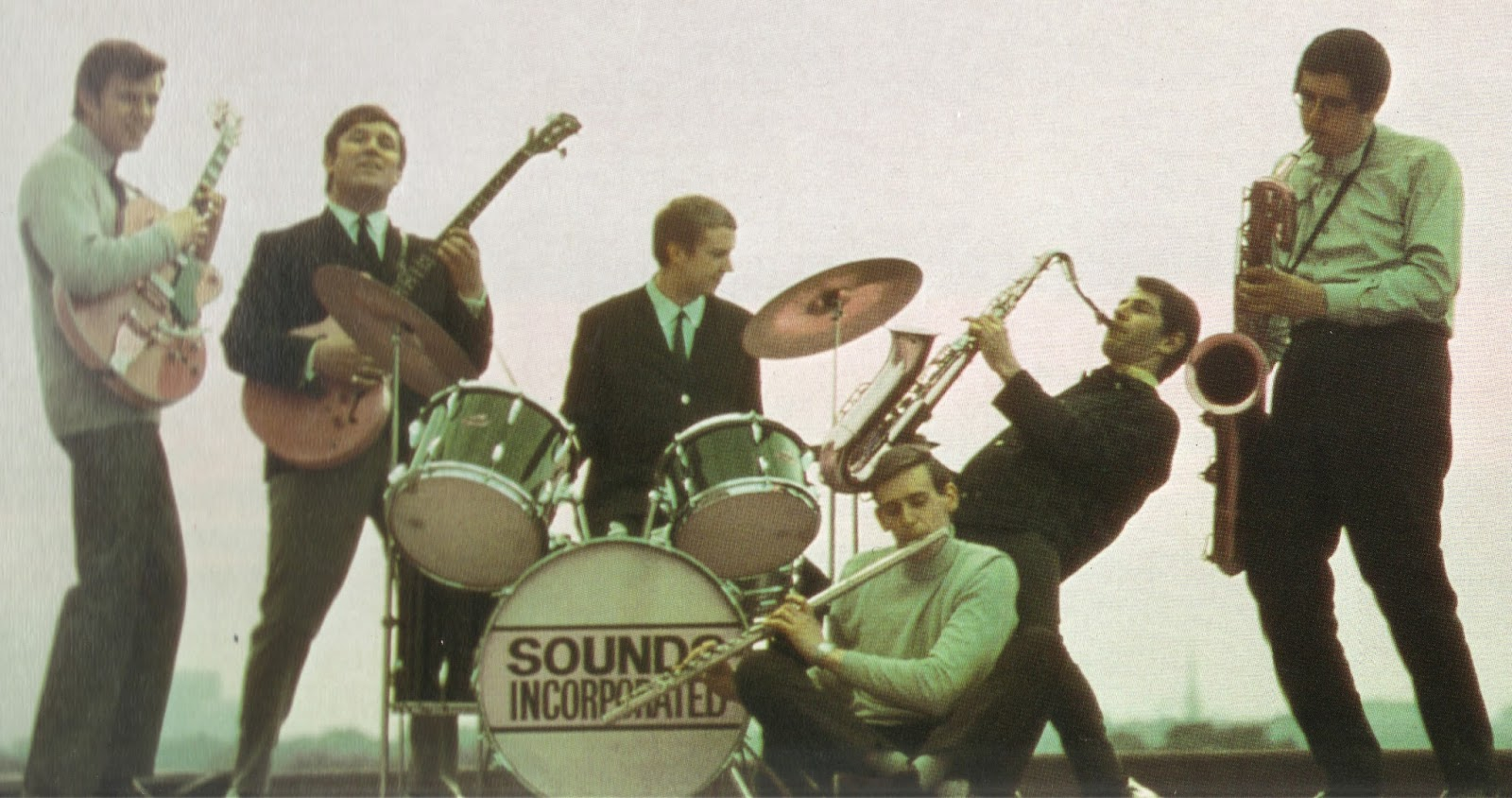 In an early publicity shot, on a chilly English morning, Sounds Incorporated still give their all.
In an early publicity shot, on a chilly English morning, Sounds Incorporated still give their all.And, what about the amazing Sounds Incorporated. The first fully instrumental band featuring Sax's instead of Shadows style guitar. They were the only band that could open for the Beatles.
And Others Who Followed...
Gerry Marsden said in April 1963, "I don't think we will be the last Liverpool, names to get into the charts, The Big Three and Billy J. Kramer are people you will be hearing about. See if I am wrong!"
And Billy J. Kramer hit the charts with the Lennon McCartney song "Do You Want To Know a Secret" followed by "Bad To Me"
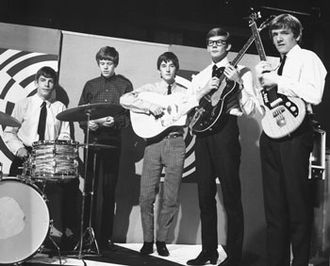 Looking very clean cut, The Hermits present the tidy image of the time.
Looking very clean cut, The Hermits present the tidy image of the time.And, there was the band who had a hit with a song about an empty milk bottle, Hermans Hermits. A typical clean cut, very English band, they put out a surprisingly high quality music. I saw the band in Adelaide, and they were very good. I even heard them do a rockn' blues session on English radio one morning.
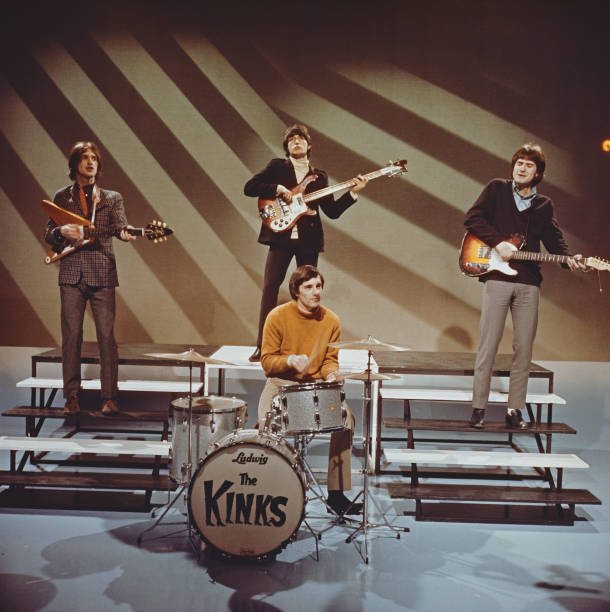
The Kontoversial Kinks
OK, that is spelt incorrectly, but that is how the Kinks named their first album. On the album cover notes, they stated one of their aims was to restore the letter K to its rightful position in the English language. Not sure how they went with that aim, but the band was one of the most successful and long lasting of the invasion bands.
"You Really Got Me, the first Kinks hit, really got me. I was lucky enough to see them in Adelaide, 21 January 1965, along with The Honeycombs, and Manfred Mann.
The band underwent a change in direction in1966, with chief songwriter ray Davies incorporating social comment in his songs.
See The Kinks albums and Story
Peter and Gordon
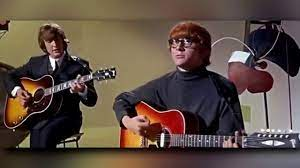
When your sister is stepping out with one of the most successful songwriters in the world, it makes sense to take advantage of that and see if he's got any songs hanging around not being used.,
And so Peter Asher, brother of Paul McCartney's girlfriend Jane Asher, and his singing partner Gordon Waller, grabbed "A World Without Love", and had a No. 1 hit UK and US. The duo went on to a successful career, lasting longer in the US than the UK.
See Peter and Gordons story HERE
Enjoy this site? Share with friends!
Read All about the British Invasion.
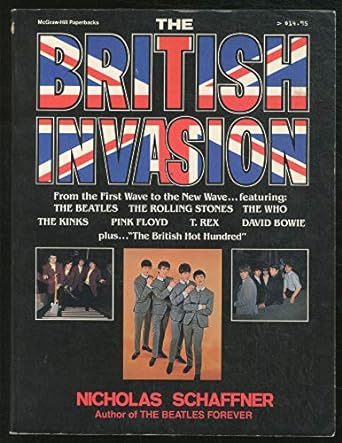
This interesting book details the British Invasion history from its reginnings to its legacy. It examines the American bands of the time who took the battle back to the UK as well as a look at the fashion and "Carnaby Street trends.
